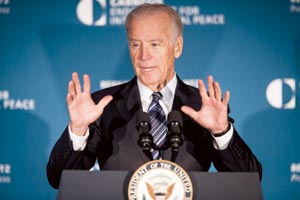Biden Calls for Infrastructure Funding, Says Administration Open to Ideas

WASHINGTON — Vice President Joe Biden said the Obama administration is “wide open” to funding mechanisms as long as infrastructure projects are sufficiently upgraded now.
“The challenges facing infrastructure today are not only resolvable, they are potential game-changers for us in a whole range of areas,” Biden said at an event here hosted by the Carnegie Endowment for International Peace on Oct. 8.
Biden touted the Obama administration’s six-year, $478 billion proposal from earlier this year that would boost investments for infrastructure projects. The plan, known as the Grow America Act, would authorize $317 billion for roads and bridges, paid for largely by a one-time 14% tax on more than $2 trillion in overseas corporate profits.
Democrats in the House have offered the Grow America Act as legislation, but it is not expected to be passed.
Still, Biden called on Congress to act immediately to address the country’s infrastructure needs.
“There used to be a bipartisan consensus that infrastructure was important. I understand why there should be legitimate debate on how we pay for infrastructure. What I don’t understand [is] how there can even be a debate on whether we need to invest in infrastructure,” Biden said.
He added: “Without investing in our entire system, how we can lead the world in the 21st century? If we don’t step up now, the price is going to be extremely high.”
While Biden delivered his keynote remarks, House Republican Majority Leader Kevin McCarthy (R-Calif.) was in the process of telling his caucus he would not seek his chamber’s speakership.
McCarthy’s announcement left the GOP majority without a clear leader this fall. Current House Speaker John Boehner (R-Ohio) is stepping down at the end of the month, leaving legislative work on transportation and other major issues in limbo until a new leader is chosen.
House transportation authorizers have yet to take up a highway reauthorization bill, even though highway funding authority expires Oct. 29.
Since House leaders are unlikely to take up a Senate-passed highway bill, Congress would need to approve a short-term funding fix to ensure road-building programs see federal dollars.
Trucking industry leaders are among the transportation stakeholders clamoring for a multiyear highway bill.
Prior to Biden’s comments, Chicago Mayor Rahm Emanuel said at the event here that investments in freight and infrastructure projects are ideal ways for cities and metropolitan regions to realize economic growth.
“If you do not invest in a 21st-century infrastructure, your economy will move in the speed of your infrastructure. We have a 20th-century infrastructure, that’s the speed. Cities are where the economic, intellectual and cultural energy of the world economy is. Chicago is one of those,” the Democratic mayor said.
He added that his administration has adopted policies designed to optimize commerce by minimizing congestion and enhancing public transportation. Emanuel and other elected officials here also called on Congress to advance a multiyear highway bill this year to help cities and states access more federal dollars.
Sen. Mark Warner (D-Va.), a member of the chamber’s tax-writing panel with jurisdiction over the Highway Trust Fund, said it is likely for leaders from both parties to focus on transportation over the next few months.
“I do think, whether it is an end-of-the-year deal or others, and an international tax reform deal or others, there is a much, much higher probability that an infrastructure financing tool” will be considered.
Elizabeth Warren (D-Mass.), a member of the Senate banking committee that oversees transit policies, warned that underinvesting in infrastructure has stifled economic growth.
“Investing in infrastructure is right at the heart of how we build the future,” Warren said.
Speakers at the event cited a survey from the American Society of Civil Engineers conducted in 2013. That survey projected that about $3.6 trillion in total investment by 2020 is needed to achieve an upgrade of the nation’s infrastructure system. That year, the group of engineers assigned a D+ grade to the country’s overall infrastructure.
Speakers also noted the United States ranks 28th in infrastructure spending compared with other developed nations.




